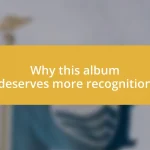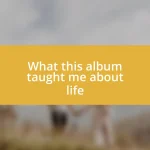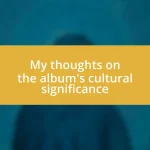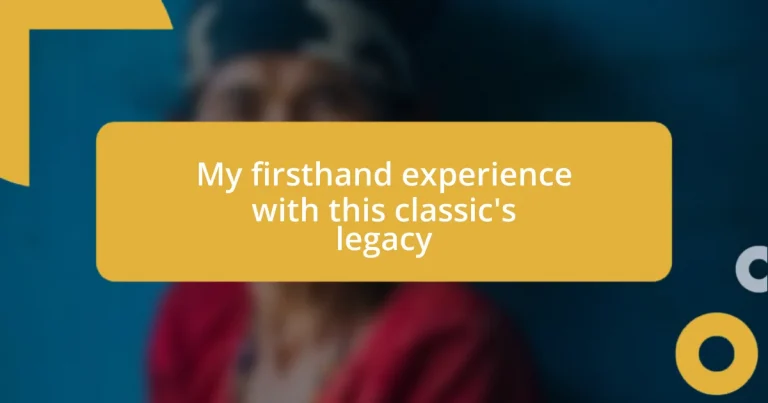Key takeaways:
- The author describes how classic literature shapes personal identity and societal perspectives, highlighting the emotional connections and lessons learned from key works like “Pride and Prejudice” and “To Kill a Mockingbird.”
- Key themes from classic literature, including love, moral integrity, and societal reflections, resonate with contemporary issues, demonstrating the timeless relevance of these narratives.
- The author emphasizes the importance of engagement with classic works through discussion and personal reflection, suggesting that these interactions deepen understanding and foster personal growth.

Introduction to the classic’s legacy
When I think about the classics, I can’t help but feel a wave of nostalgia wash over me. Classics aren’t just dusty books; they hold timeless lessons and emotions that resonate through the ages. Have you ever read something that felt like it was speaking directly to your soul? That’s the magic of these enduring works.
I remember the first time I cracked open a copy of “Pride and Prejudice.” The wit of Elizabeth Bennet and the brooding charm of Mr. Darcy pulled me in, and I found myself not just reading a story, but stepping into a world filled with societal expectations and personal convictions. This connection made me realize how deeply the legacy of classic literature shapes our perspectives even today.
The classics teach us about human nature, morality, and the struggles that define our existence. Isn’t it fascinating how stories from centuries ago can still mirror our contemporary lives? For me, engaging with these texts feels like having a conversation with the past, one that enriches my understanding of the present and inspires hope for the future.
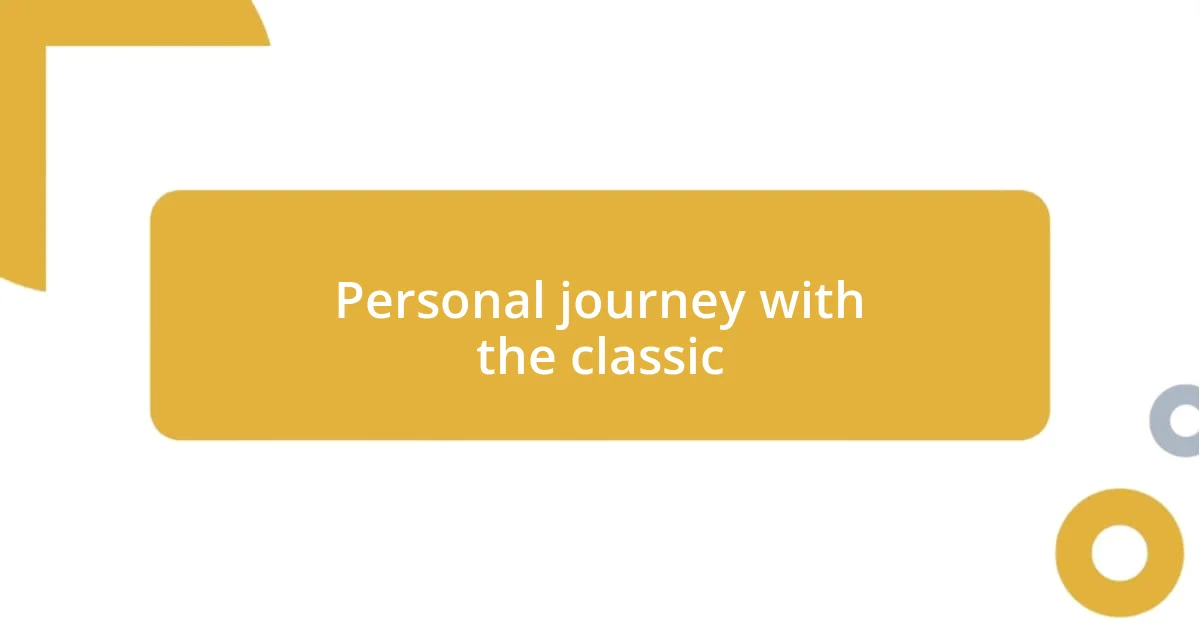
Personal journey with the classic
My journey with the classics began in a dusty corner of my grandmother’s attic. I stumbled upon her worn-out copy of “Moby Dick.” The pages felt fragile under my fingertips, but the adventure within them ignited a passion for literature I never knew I had. I vividly remember spending hours curled up in an old armchair, entranced by Melville’s words, feeling the ship’s wooden deck beneath my feet as I joined Captain Ahab on his relentless pursuit. It was a transformative experience that opened my eyes to the power of storytelling.
Here are a few key moments from my personal journey with classic literature:
- Discovery of Different Perspectives: Each classic introduced me to diverse viewpoints, helping me grasp the complexity of human emotions and relationships.
- Emotional Connections: Characters became like old friends who taught me about resilience, love, and the human condition.
- Inspiring Reflection: Reading classics encouraged me to analyze my own life choices, sparking meaningful conversations with others about our shared experiences.
Every classic I’ve read since that fateful attic moment has deepened my appreciation for literature’s role in shaping identity and understanding the world around us.
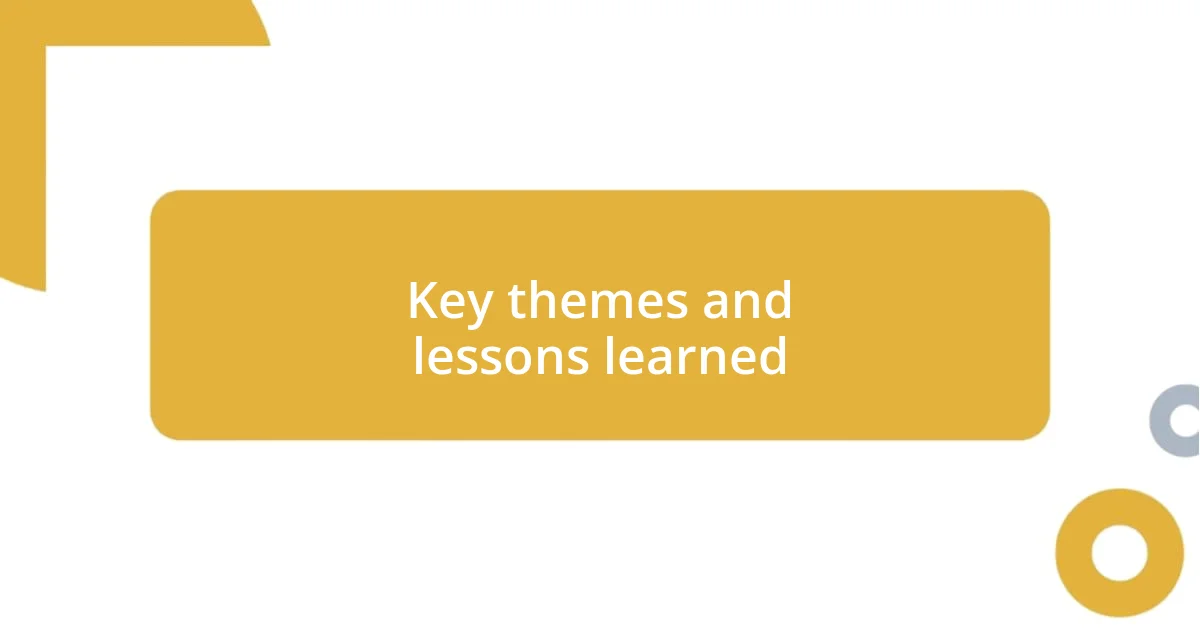
Key themes and lessons learned
The key themes embedded in classic literature revolve around love, conflict, and the quest for identity. I recall one particularly poignant instance while reading “Wuthering Heights.” The tumultuous love story between Heathcliff and Catherine resonated with me, evoking a whirlwind of emotions as I witnessed the lengths to which love can drive us, often leading to both passion and despair. This experience taught me about the duality of love – how it can uplift us while simultaneously tearing us apart.
Another central lesson I took away from the classics is the importance of moral integrity and making choices. In “To Kill a Mockingbird,” Atticus Finch stood as a beacon of morality, and I was profoundly moved by his steadfast commitment to justice, despite overwhelming pressure to conform. His actions inspired me to consider how I navigate my own ethical dilemmas, reminding me that standing up for what is right often involves personal sacrifice.
When reflecting on society and its evolution, classics reveal patterns that persist through generations. For instance, “The Great Gatsby” left an indelible mark on my understanding of the American Dream. The illusion and disillusionment portrayed in F. Scott Fitzgerald’s work resonate with contemporary issues of ambition and discontent. It made me wonder: How do we evaluate success in our lives? It’s a question I still ponder, one that seems as relevant now as it was in the Roaring Twenties.
| Key Theme | Lesson Learned |
|---|---|
| Love | The duality of love can lead to both profound connection and heartache. |
| Moral Integrity | Standing up for justice often requires personal sacrifice. |
| Societal Reflection | The ongoing pursuit of the American Dream can lead to disillusionment. |
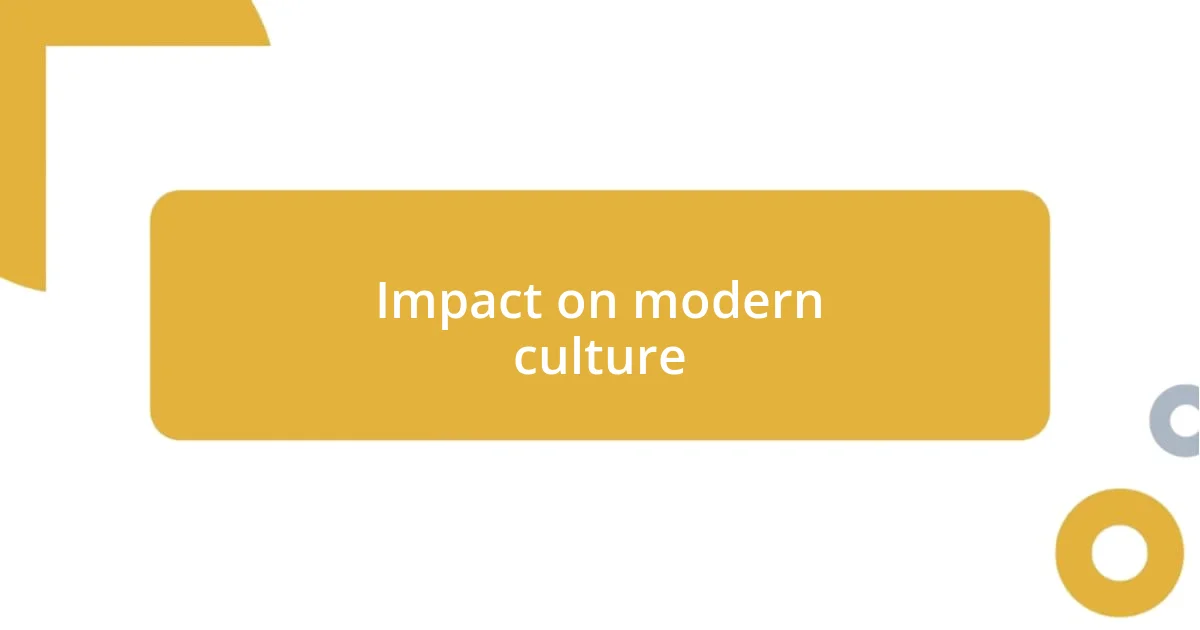
Impact on modern culture
Classic literature continues to shape modern culture in profound ways. I often find myself watching films or TV shows that borrow heavily from these timeless stories. For instance, has anyone else noticed how many contemporary plots echo the struggles of characters like Jay Gatsby or Elizabeth Bennet? These narratives tap into our collective consciousness, reminding us that the themes of ambition, love, and social status remain relevant.
I’ve also recognized that classic works often serve as a backdrop for discussions in today’s society. Whether in a classroom or over coffee with friends, references to “To Kill a Mockingbird” or “1984” open up pathways for meaningful conversations about justice and freedom. I remember a particularly vivid debate in a book club where we reflected on Scout’s innocence amid injustice. It felt empowering to connect those historical issues to our current social climate, reinforcing the idea that literature can be a lens through which we view the world.
Finally, classic literature often serves as a source of inspiration in art and music today. When I listen to a contemporary song that captures the essence of a classic’s themes—whether it’s heartbreak reminiscent of “Wuthering Heights” or the existential ponderings akin to “Crime and Punishment”—I can’t help but feel a sense of continuity. It makes me wonder: how do these age-old narratives still resonate today? The intertwining of new and old stories illustrates the undeniable legacy of classics, as they ignite creativity and offer timeless wisdom to modern audiences.
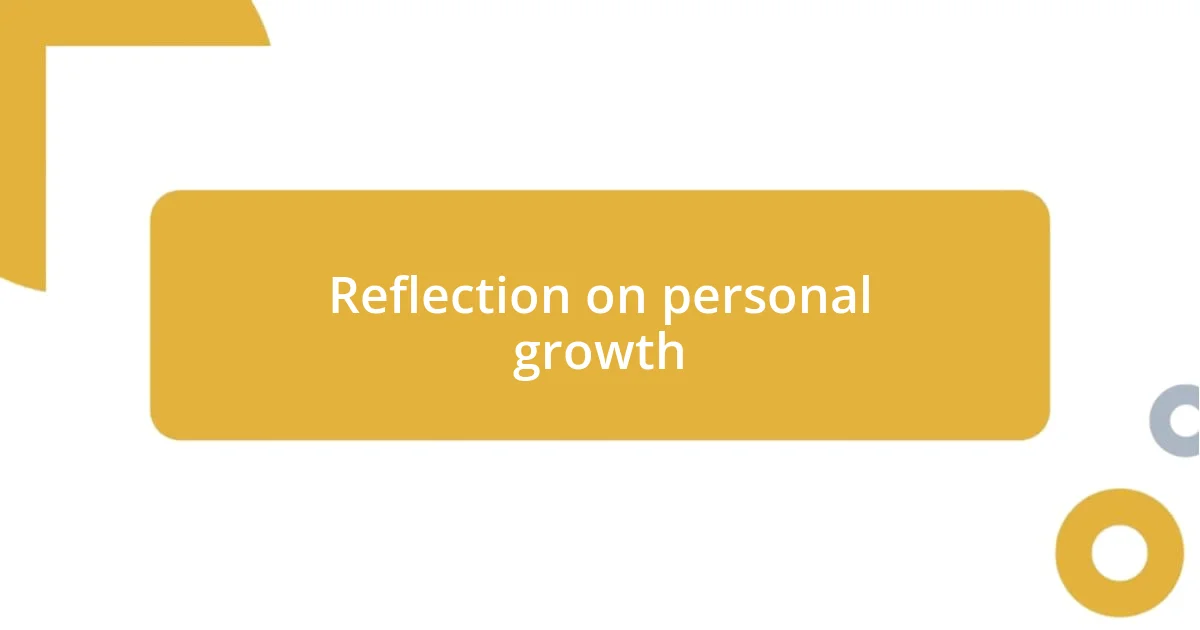
Reflection on personal growth
While reflecting on my personal growth through classic literature, I realize how much these stories have shaped my values. I remember feeling deeply connected to the characters, like when I reached the pivotal moment in “Pride and Prejudice” when Elizabeth Bennet decides to stand true to herself. It was a moment that made me question my own decisions and whether I was as brave in my convictions.
Engaging with these narratives has taught me the importance of resilience. There were times when I faced personal challenges, much like the characters in “The Count of Monte Cristo” navigating betrayal and loss. Each time I revisited those themes, I found solace and strength, prompting me to ask myself: How can I turn my own adversities into opportunities for growth?
Ultimately, these reflections on classic literature have deepened my understanding of who I am and who I aspire to be. I often think back to moments in “Les Misérables,” especially Jean Valjean’s transformation. His journey of redemption ignited a desire within me to seek forgiveness and make amends in my own life. How often do we forget that change is possible? This realization has not only motivated me but has also inspired me to approach life with a more open heart and a willingness to learn from my past.
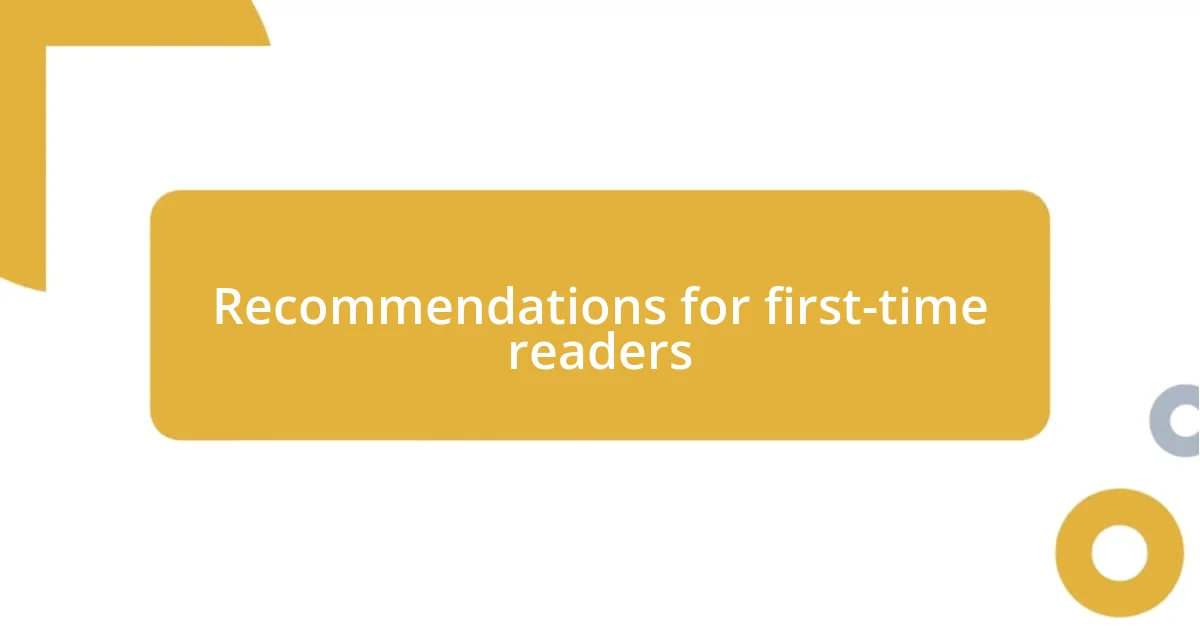
Recommendations for first-time readers
When diving into classic literature for the first time, I suggest keeping an open mind. I remember picking up “The Great Gatsby” as a teenager, initially confused by the language and societal references. But as I persisted, those layers began to peel back, revealing a compelling narrative about dreams and disillusionment. Have you ever felt that initial struggle? Trust me, every struggle opens a window to deeper understanding.
It can also be helpful to read with a notebook nearby. I found that jotting down my thoughts or favorite quotes brought the story to life in a new way. For example, while reading “Moby-Dick,” I started to note down how Melville’s vivid imagery resonated with my own experiences at sea—the thrill of the waves matched with the introspective journey of Captain Ahab. This practice not only enhances comprehension but makes personal connections that enrich the reading experience.
Lastly, I highly recommend discussing what you read with others. I vividly recall joining a book club after reading “Jane Eyre.” Sharing my thoughts and hearing different perspectives opened my eyes to new interpretations I had never considered. Isn’t it fascinating how a single story can evoke so many responses? Engaging in dialogue can deepen your appreciation of the narrative and help solidify your insights as a first-time reader.
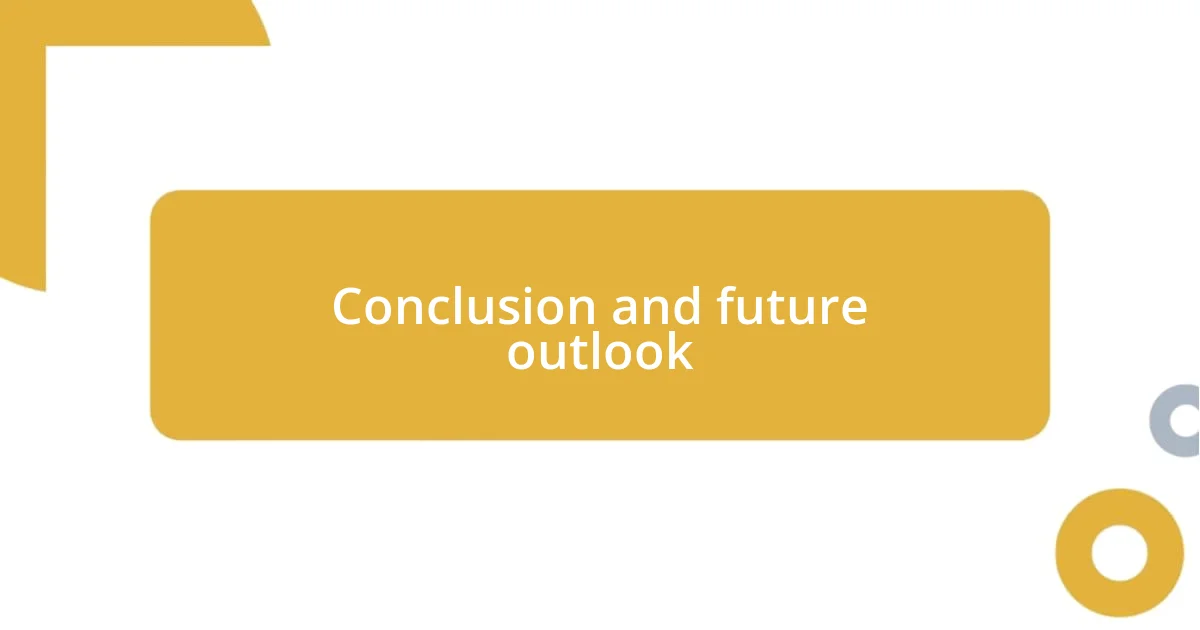
Conclusion and future outlook
Reflecting on my journey through classic literature, I feel a sense of gratitude for the enduring impact these stories have on our lives. They beckon us to explore not just the hearts of their characters, but our own as well. I often ponder, will future generations still be able to resonate with these timeless lessons? I believe they will, as long as we keep the discussions alive and share our experiences.
Looking ahead, I see a landscape where classic literature evolves but remains relevant. The digital age has opened new avenues for exploration, through podcasts and discussions that breathe fresh life into these texts. I remember how a simple video essay on “Crime and Punishment” clarified so much for me—it changed my perspective. As technology enhances our access to these stories, who knows what insights we may uncover next?
In the end, I am hopeful that classic literature will continue to inspire personal growth and reflection for many more readers. Each page turned holds the potential for a profound transformation. What legacy will we leave for those who come after us? I envision a world filled with readers who draw strength and wisdom from the classics, just as I have done.



